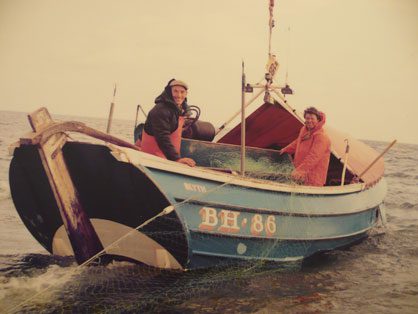11 February 2011
The North East drift net fishery has come under sustained pressure from the powerful and well connected angling lobby for over 30 years.
Most fishermen in Northumbria would agree that it has survived the onslaught of the anglers’ pressures primarily because of the determined and resourceful efforts of the the NFFO Salmon Committee, led by Chairman Derek Heselton.
Over three decades, the Committee has marshalled evidence, worked with scientists and Government officials, harried politicians, exposed distortions and faced down threats, to make the case that the North East drift net fishery is one of the best and closely managed fisheries in Europe.
This, over the years has been a titanic struggle over shares of a scarce resource. Some of the richest and most powerful interests in the country have coveted the fish caught in one of the oldest coastal fisheries, to boost their recreational rod fisheries in the rivers. The angling lobby succeeded in closing the salmon drift net fishery in Scottish waters in the 1960s.
The Salmon Committee has fought back by repeatedly exposing the sham conservation arguments used by the anglers to try to force a closure of the drift net fishery. In fighting this uneven fight it has gathered impressive and sometimes unexpected allies to fight at his side.
Undoubtedly the most damaging setback came, in 1992, when Tory Fisheries Minister John Selwyn Gummer, using the shield of a review of the fishery, announced that the drift net fishery would be phased out on the grounds that it was “interceptory”. In fact, the review itself was a sound piece of work that was used import the political aspirations of the angling lobby into the salmon conservation debate. A moment’s thought confirms that all fisheries commercial or recreational, net or rod and line are “interceptory”. What matters from a conservation perspective, is the total out-take of fish, not whether they are caught in the rivers or at sea.
As the terms of the phase-out meant that drift net licences had to be surrendered when the licence holder retired, there has been a slow attrition of licences, subsequently accelerated by a licence buy-out when the anglers considered the phase-out to be proceeding too slowly for their tastes and put the majority of the money forward to buy out the rights of those prepared to sell.
There are now only 14 drift net licences issued but last years’ season was a good one with prices for wild salmon receiving a premium. Along with the T and J net fisheries, the NFFO will continues to support these small fisheries that have showed, over many years, a tenacity and fighting spirit that has ensured their survival against the odds.

